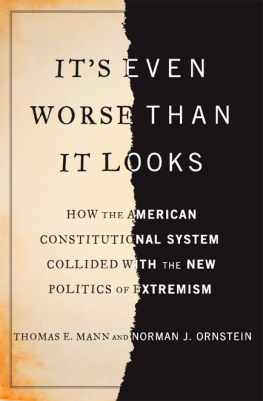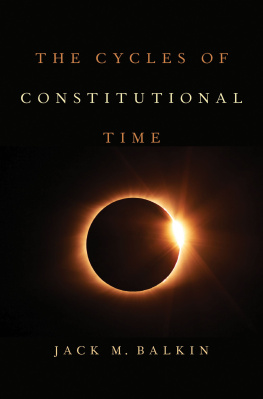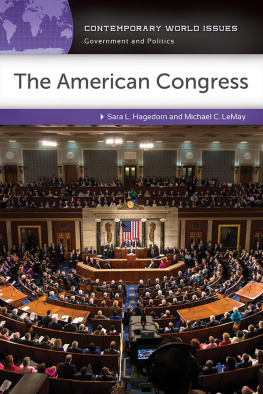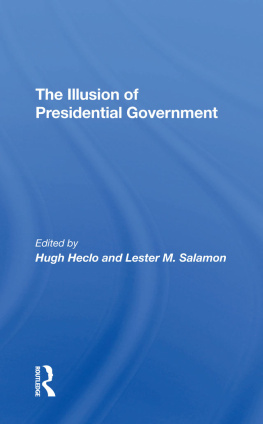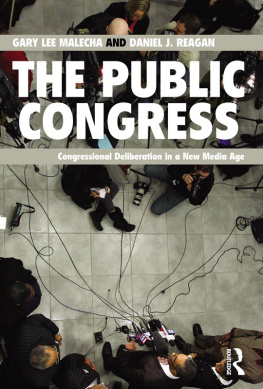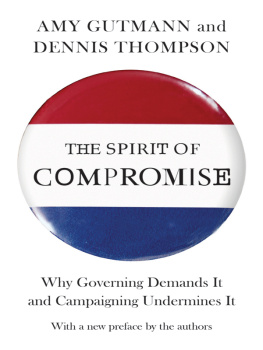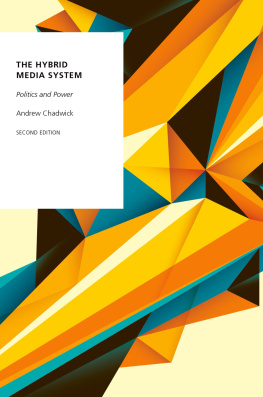This book, like its 2006 predecessor, The Broken Branch, had its origin in an invitation from Tim Bartlett, then editor at Oxford University Press and now with Basic Books, to write a book addressing problematic features of American democracy that would be accessible to a broad public audience. In 2006 the focus was on the institutional shortcomings of Congress. This book deals more ambitiously with the countrys overall dysfunctional politics. Tims proposal to us in August 2011that we write a short book very quickly that captured the dynamic of our governing problems and outlined a strategy for overcoming themwas audacious but, in the end, very attractive. His guidance, editing, and support were essential components of the books timely completion.
Ours is not a report on new, original research but an extended essay that synthesizes the work of countless others and reflects years of our own Washington-watching and discussions with dear colleagues. The former is reflected in the large number of endnotes. The latter includes Sarah Binder, E.J. Dionne Jr, Bill Galston, Pietro Nivola, and Darrell West at Brookings, and Karlyn Bowman at AEI. Others who generously read all or parts of the manuscript were Al Franken, John Kingdon, Ryan Lizza, Sheilah Mann, David Price, and Michael Robinson.
We would like to offer special thanks to Raffaela Wakeman, who worked closely with us on the book and the inaugural World Forum on Governance during a very busy falleven as she juggled the heavy workload from a first year at Georgetown Law School. Others who provided valuable assistance were Eric Glickman, Chris Lin, and Ross Tilchin at Brookings and Jennifer Marsico and Andrew Rugg at AEI.
Thanks also to the rest of our talented team at Basic Books, including Sarah Rosenthal and Caitlin Graf, and to Mark Corsey and Jane Gebhart at Eclipse Publishing Services.
Finally, a note of heartfelt thanks to the many present and former members of Congress, Republicans and Democrats, who have been constructive mentors and occasional targets of our broadsides. We especially want to thank the Republicans, moderate and conservative, who were role models of constructive engagement and patriotic problem-solving, including the late Barber Conable and Bill Steiger, along with people like Howard Baker, Bob Bennett, Sherry Boehlert, Jack Buechner, Mike Castle, Bob Dole, Mickey Edwards, Bill Frenzel, Chuck Hagel, Nancy Kassebaum, Ray LaHood, Connie Morella, John Porter, Al Simpson, Vin Weber, and too many others to recount. You are all missed in the political arenaand if you were still there and as effective as you were, this book would be unnecessary.
While we stand on the shoulders of many, we alone are responsible for whatever errors and misjudgments remain.
Introduction
155 Cong. Rec. S5342 (daily ed. May 12, 2009) (statement of Sen. McConnell on the Trustees Annual Report).
Fred Hiatt, McConnells cynical flip, Washington Post, February 1, 2010.
Jeff Zeleny and Megan Thee-Brenan, New Poll Finds a Deep Distrust of Government, New York Times, October 26, 2011.
, supplement.
Chapter 1
.
.
.
.
.
.
.
Dennis, MacGillis, and Montgomery, Origins.
.
.
.
.
.
.
.
.
.
Ibid.
Ibid.
.
. Italics added.
. Emphasis is the authors.
.
Chapter 2
This story is recounted in Thomas E. Mann and Norman J. Ornstein, The Broken Branch (New York: Oxford University Press, 2006), pp. 64122.
Richard F. Fenno, If, as Ralph Nader Says, Congress Is The Broken Branch, How Come We Love Our Congressmen So Much? In Congress in Change: Evolution and Reform, ed. Norman J. Ornstein (New York: Praeger, 1975).
Peter Osterlund, A Capitol Chameleon: What Will Newt Gingrich Do Next? Los Angeles Times, August 25, 1991.
David Osborne, Newt Gingrich: Shining Knight of the Post-Reagan Right, New Republic, November 1, 1984.
.
.
.
Sean Theriault and David Rohde, The Gingrich Senators and Party Polarization in the Senate, Journal of Politics, August 2011, DOI: 10.1017/S0022381611000752.
.
.
Causes, and Consequences, Annual Review of Political Science 9 (June 2006): 83110.
Ronald Brownstein, The Four Quadrants of Congress, National Journal, January 30, 2011.
Sinclair summarizes much of the evidence. See Barbara Sinclair, Party Wars (Norman: University of Oklahoma Press, 2006), pp. 2228.
Morris P. Fiorina and Samuel J. Abrams, Disconnect (Norman: University of Oklahoma Press, 2009).
Most recently, Alan Abramowitz, The Disappearing Center (New Haven, CT: Yale University Press, 2010).
Nolan McCarty, Keith T. Poole, and Howard Rosenthal, Does Gerrymandering Cause Polarization? American Journal of Political Science 53, no. 3, pp. 666680 (July 2009). Thomas E. Mann, Polarizing the House of Representatives: How Much Does Gerrymandering Matter? in Red and Blue Nation? Volume I, eds. Pietro S. Nivola and David W. Brady (Washington, DC: Brookings Institution Press, 2006).
The next several pages are drawn in part from Mann, Polarizing the House of Representatives.
Nelson W. Polsby, How Congress Evolves: Social Bases of Institutional Change (New York: Oxford University Press, 2003).
.
Bill Bishop, The Big Sort (New York: Houghton Mifflin Harcourt, 2008).
Sinclair, Party Wars.
.
Sarah Binder and Thomas E. Mann, Constraints on Leadership in Washington, Issues in Governance Studies 41 (July 2011), Brookings Institution.
Frances E. Lee, Beyond Ideology: Politics, Principles and Partisanship in the U.S. Senate (Chicago: University of Chicago Press, 2009).
Nolan McCarty, Keith T. Poole, and Howard Rosenthal, Polarized Politics: The Dance of Ideology and Unequal Riches (Cambridge, MA: MIT Press, 2008). Much of this is summarized in Sinclair, Party Wars, chapter 2; Jacob S. Hacker and Paul Pierson, Off Center: The Republican Revolution and the Erosion of American Democracy (New Haven, CT: Yale University Press, 2006); Geoffrey Kabaservice, Rule and Ruin: The Downfall of Moderation and the Destruction of the Republican Party, From Eisenhower to the Tea Party (New York: Oxford University Press, 2012).
Kabaservice, Rule and Ruin, p. xvi.
.
.
.
Theda Skocpol and Lawrence Jacobs, eds., Reaching for a New Deal: Ambitious Governance, Economic Meltdown, and Polarized Politics in Obamas First Two Years (New York: Russell Sage Foundation, 2011).
Gallup Poll, op. cit.
.
Poole and Rosenthal, Party Polarization.
.
.
Adam Thierer, Submission to Participants in Knight Foundation/AEI Workshop on the Information Needs of Communities in a Digital Age, paper presented at AEI discussion and working lunch, April 12, 2010, p. 4.
Ibid., p. 4.
See, for example, Martin Kaplan and Matthew Hale, Local TV News in the Los Angeles Media Market: Are Stations Serving the Public Interest? (Los Angeles: The Norman Lear Center, March 11, 2010).
.
.
.
.
.
.
.
Paul Farhi, The email rumor mill is run by conservatives, Washington Post, November 17, 2011.
Robert G. Kaiser, So Much Damn Money: The Triumph of Lobbying and the Corrosian of American Government (New York: Knopf, 2009).
. Italics added.
Anthony Corrado, Money and Politics: A History of Federal Campaign Finance Law, in The New Campaign Finance Sourcebook, eds. Anthony Corrado, Daniel R. Ortiz, Thomas E. Mann, and Trevor Potter (Washington, DC: Brookings Institution Press, 2005), p. 7.

